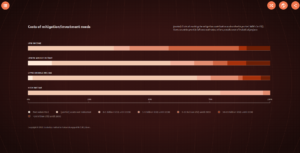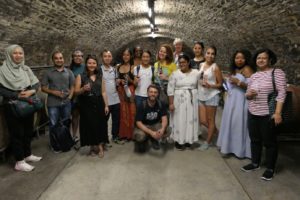The German Development Institute / Deutsches Institut für Entwicklungspolitik (DIE) will be represented by Mariya Aleksandrova, Sander Chan and Gabriela Iacobuta, senior researchers in the project „Klimalog: Research and dialogue for a just and SDG-compatible implementation of the Paris Climate Agreement„, at the UN Climate Change Conference (COP25) in Madrid (2 to 13 December 2019).
Together with partners from around the world, DIE will (co-)host multiple events. In the following, we provide an overview of the highlights.
Nature-based solutions and Global Climate Action – strengthening synergies beyond 2020
Tuesday, 3 December 2019, 16:45-18:15 hrs, IFEMA – Feria de Madrid, Room 6
Nature-based solutions play a key role in Global Climate Action beyond 2020. This event, co-hosted with i.a. York University, Canada, and the University of São Paulo, highlights synergies across non-state, local, and regional actors and between the UNFCCC and Convention on Biological Diversity (CBD). Panelists, including DIE Senior Researcher Sander Chan and Associated Researcher Idil Boran (York University), will share best practices in nature-based climate action and discuss opportunities to strengthen them within the UNFCCC.
The EU’s external cooperation post-2020: boosting ambitious and coherent climate action
Wednesday, 11 December 2019, 12:30-14:00 hrs, EU Pavillion, Room Helsinki
Climate change and sustainable development are inextricably linked, for instance in the agricultural sector. To discuss these linkages, the EU Commission’s Directorate-General for International Cooperation and Development (DEVCO), the Institute for Sustainable Development and International Relations (IDDRI), and DIE co-organize „The EU’s external cooperation post-2020: boosting ambitious and coherent climate action“. The event will feature i.a. DEVCO Director Carla Montesi and the Commissioner for Climate Policy and Climate Financing of the German Federal Ministry for Economic Cooperation and Development, Dr Heike Henn. DIE Researcher Gabriela Iacobuta and Associate Researcher Jonathan Mockshell will contribute research insights on NDC-SDG linkages and EU development cooperation’s role in agriculture.
Breaking new ground: Advancing Loss and Damage governance and finance mechanisms
Thursday, 12 Dezember 2019, 15:00-16:30 hrs, IFEMA – Feria de Madrid, Room 3
In “Breaking new ground: Advancing Loss and Damage governance and finance mechanisms”, ACT Alliance, Bread for the World – Germany, IDDRI, and DIE explore pathways to advance governance and financing of loss and damage. DIE Senior Researcher Mariya Aleksandrova and Associated Researcher Idil Boran (York University) discuss elements of effective governance, linking loss and damage policy with the long-term climate goals and the 2030 Agenda.
In addition, DIE guest researcher and Alexander von Humboldt Research Fellow, Diogo Andreola Serraglio will discuss legal approaches that could foster the adoption of concrete measures to address climate-induced mobility in Latin America at a side event organized by the South American Network for Environmental Migrations (RESAMA) and the Observatory on Climate Change, Disasters and Human Mobility in Latin America and the Caribbean (MOVE-LAM), with the support of EUROCLIMA+. The event „Strategies for climate action in Latin America: human mobility in the spotlight“ will take place on Friday, 6 December.
Our Must-Reads for COP25:
Harnessing EU external cooperation to boost ambitious and coherent climate action
 Are you interested in the contents of the National Determined Contributions (NDCs)? Use our interactive NDC Explorer to analyse the climate protection plans of all countries worldwide in over 60 categories.
Are you interested in the contents of the National Determined Contributions (NDCs)? Use our interactive NDC Explorer to analyse the climate protection plans of all countries worldwide in over 60 categories.
You have questions about the activities of DIE during the UN Climate Change Conference, want to meet our scientists on site or are interested in our research and policy advice in the field of climate policy?
Contact us: presse@die-gdi.de

